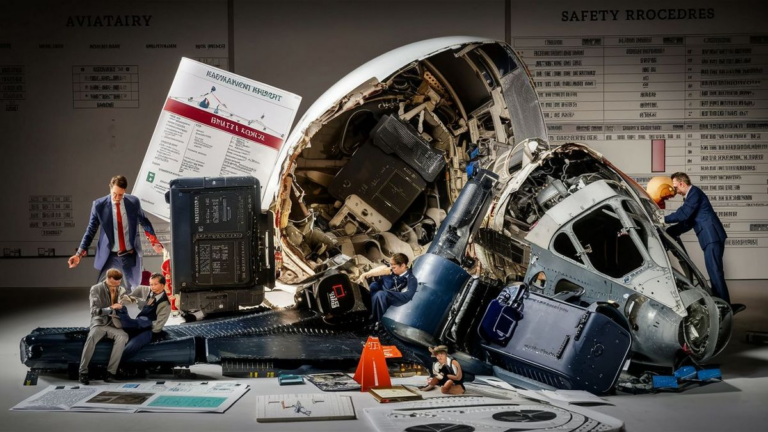Being informed about aircraft accidents and incidents is crucial for various reasons, spanning from personal safety to industry-wide improvements and public awareness.
Enhancing Safety Measures
One of the primary reasons for staying informed about aircraft accidents and incidents is to enhance safety measures. Each incident offers valuable insights into potential safety hazards and areas that require improvement. By analyzing accidents, aviation authorities can implement changes to regulations, procedures, and technology to prevent similar incidents in the future.
Personal Safety Awareness
For individuals who frequently travel by air, staying informed about aircraft accidents and incidents is essential for personal safety awareness. Understanding the causes and circumstances of past accidents can help passengers make informed decisions about their travel plans and choose safer airlines or routes.
Industry Accountability
Public awareness of aircraft accidents and incidents holds the aviation industry accountable for safety standards. Transparency regarding accidents fosters trust between passengers and airlines, encouraging companies to prioritize safety and invest in rigorous training programs and maintenance protocols.
Preventing Recurrence
By studying past accidents, aviation authorities can identify recurring patterns or systemic issues that contribute to incidents. This proactive approach allows for the implementation of corrective actions to prevent similar accidents from occurring in the future, ultimately saving lives and preserving aircraft integrity.
Continuous Improvement
Staying informed about aircraft accidents and incidents fosters a culture of continuous improvement within the aviation industry. Each accident serves as a learning opportunity, prompting stakeholders to collaborate on innovative solutions and best practices to mitigate risks and enhance overall safety.
Public Confidence
Timely and accurate reporting of aircraft accidents and incidents promotes public confidence in air travel. When passengers are aware that authorities are diligently investigating accidents and implementing measures to prevent recurrence, they feel more reassured about the safety of air transportation.
Legal and Insurance Considerations
For legal and insurance purposes, being informed about aircraft accidents and incidents is crucial. Accident reports and investigations play a vital role in determining liability, compensating victims, and establishing regulatory compliance. Additionally, insurance companies rely on accident data to assess risks and set premiums.
Contributing to Aviation Research
Information gathered from aircraft accidents and incidents contributes to aviation research and development. Researchers analyze accident data to identify trends, develop predictive models, and design advanced safety systems that further enhance aviation safety standards.
Global Impact
Staying informed about aircraft accidents and incidents extends beyond individual safety concerns—it has a global impact. International collaboration and information sharing allow aviation authorities worldwide to collectively address safety challenges, harmonize regulations, and improve emergency response protocols.
Being informed about aircraft accidents and incidents is not only about understanding past events but also about shaping the future of aviation safety. By leveraging lessons learned from accidents, implementing preventive measures, and fostering a culture of transparency and accountability, we can strive towards a safer and more resilient aviation industry.
Frequently Asked Questions
Here are some commonly asked questions regarding aircraft accidents and incidents:
| Question | Answer |
|---|---|
| How are aircraft accidents investigated? | Aircraft accidents are typically investigated by specialized authorities such as the National Transportation Safety Board (NTSB) in the United States. Investigations involve gathering evidence from various sources including flight data recorders, eyewitness accounts, and wreckage analysis. |
| What role do black boxes play in accident investigations? | Black boxes, officially known as flight data recorders and cockpit voice recorders, are crucial in understanding the sequence of events leading up to an aircraft accident. They record essential flight parameters and cockpit conversations, providing invaluable insights for investigators. |
| How do aircraft accidents impact airline operations? | Aircraft accidents can have significant ramifications on airline operations, including reputational damage, financial losses, and regulatory scrutiny. Airlines often undergo thorough safety reviews and may implement operational changes to reassure passengers and stakeholders. |
| What measures can passengers take to enhance their safety? | Passengers can enhance their safety by staying informed about airline safety records, following pre-flight safety instructions, and reporting any concerns to airline staff. Additionally, choosing reputable airlines with strong safety track records can further mitigate risks. |
Understanding Legal and Insurance Implications
Aside from personal safety and industry improvements, being informed about aircraft accidents and incidents also helps individuals understand the legal and insurance implications involved. Accurate knowledge about liability, compensation processes, and insurance coverage can be crucial in navigating the aftermath of such events.






